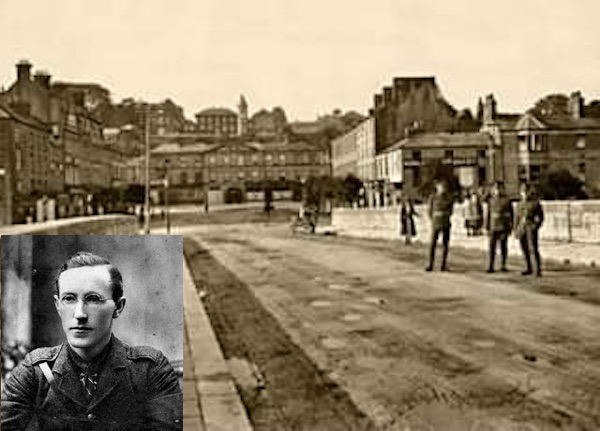
The first organised IRA action against the British Army in 1919 since the Rising was followed by the first revenge raids, 100 years ago this month.
For much of 1919, IRA activity involved capturing weaponry and freeing republican prisoners, while the Irish parliament in Dublin set about building a state. In September, the British government outlawed Dáil Éireann and Sinn Féin, and the conflict intensified.
The first organised action against British military forces since the 1916 rising took place at Fermoy on Sunday, 7 September 1919.
It was carried out by the IRA’s Cork No. 2 Brigade under the command of Liam Lynch (pictured, inset). Their objective was an armed party of British soldiers who passed through the town of Fermoy every Sunday, their church being about half a mile from their barracks.
The aim of the ambush, as with most such operations in 1919, was to capture badly-needed weapons. The decision to mount the attack was a daring one given the overwhelming numbers of British forces in the garrison town of Fermoy and the fact that the Volunteers were armed only with revolvers. The operation was authorised on condition that Lynch would disarm the British soldiers without causing casualties.
Approximately twenty-five volunteers from Fermoy company, armed with just six revolvers between them, assembled in groups of two and three, remaining well spread out to avoid attracting attention.
Another group was detailed to collect the rifles and transfer them to cars parked nearby, while the remainder were to close in from the rear. Any Volunteers who were unarmed carried short clubs hidden on their person.
A whistle blast began the assault. Liam Lynch called on the soldiers to surrender but they immediately resisted. The attackers rushed them, shots were fired and for a minute or two there was a confused struggle. A soldier swinging a rifle butt at Lynch was shot dead while three others were wounded.
When the soldiers were finally overpowered their rifles were taken from them and piled into two cars. Both cars headed out the Tallow road while the remaining Volunteers scattered on foot.
Shortly afterwards a bugle call at the barracks raised the alarm and within minutes two lorry loads of British military were speeding out the Lismore road in pursuit. However, a mile and a quarter from the town, two trees on the road side had been partly sawn through and then held in position by ropes. The moment the cars carrying the rifles passed, the trees came down with a crash thereby forcing the pursuers to make a detour and lose the trail. At Kilmagner, five miles from Fermoy, the rifles were taken to a pre-arranged spot and safely concealed.
Parties of military in lorries scoured the countryside, cars were held up and many people questioned. Two days later the district was proclaimed a military area.
On the Monday night following the raid a large party of soldiers from the British garrison at Fermoy descended upon the town. They smashed the windows in most of the shops in Pearse Square, MacCurtain Street and Patrick Street and looted the contents.
The following night the troops were confined to barracks, but on the Wednesday night they assembled again but found a large crowd of residents waiting for them in Emmet Street. Armed with sticks, stones and other weapons, the local people attacked the soldiers so furiously that they were driven back to their barracks. Many citizens barricaded their homes and premises and prepared to defend them against further attack.
The Fermoy reprisals were the first such revenge raids by the British Army, and many worse were to follow once the Black and Tans and Auxiliaries were introduced.
![[Irish Republican News]](https://republican-news.org/graphics/title_gifs/rn.gif)
![[Irish Republican News]](https://republican-news.org/graphics/title_gifs/harp.gif)

